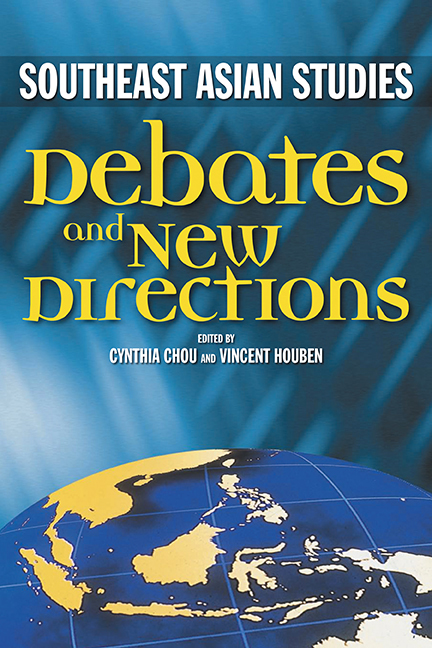Book contents
- Frontmatter
- Contents
- List of Contributors
- Preface
- 1 Introduction
- 2 Southeast Asia: Personal Reflections on a Region
- 3 Region, Academic Dynamics, and Promise of Comparitivism: Beyond Studying ‘Southeast Asia’?
- 4 Towards Multi-Laterality in Southeast Asian Studies: Perspectives from Japan
- 5 The Academic's New Clothes: The Cult of Theory versus the Cultivation of Language in Southeast Asian Studies
- 6 Rethinking Southeast Asian Politics
- 7 Reconceptualizing Southeast Asian Studies
- 8 Southeast Asian History: The Search for New Perspectives
- 9 Film, Literature, and Context in Southeast Asia: P. Ramlee, Malay Cinema, and History
- Bibliography
- Index
2 - Southeast Asia: Personal Reflections on a Region
Published online by Cambridge University Press: 21 October 2015
- Frontmatter
- Contents
- List of Contributors
- Preface
- 1 Introduction
- 2 Southeast Asia: Personal Reflections on a Region
- 3 Region, Academic Dynamics, and Promise of Comparitivism: Beyond Studying ‘Southeast Asia’?
- 4 Towards Multi-Laterality in Southeast Asian Studies: Perspectives from Japan
- 5 The Academic's New Clothes: The Cult of Theory versus the Cultivation of Language in Southeast Asian Studies
- 6 Rethinking Southeast Asian Politics
- 7 Reconceptualizing Southeast Asian Studies
- 8 Southeast Asian History: The Search for New Perspectives
- 9 Film, Literature, and Context in Southeast Asia: P. Ramlee, Malay Cinema, and History
- Bibliography
- Index
Summary
INTRODUCTION
This chapter is a development of some of the ideas which I raised at a workshop on the subject of “Locating Southeast Asia” in late March 2001, held at the University of Amsterdam, in honour of Professor Heather Sutherland's contribution to Southeast Asian studies in the Netherlands. I happened to be a discussant on the anthropology panel led by the American anthropologist, Mary Margaret Steedly, who had then only recently published an excellent and thought-provoking overview paper on the theme of culture theory in the anthropology of Southeast Asia.
There was a broad range of issues which we addressed in the Amsterdam meeting, and aside from commenting on Steedly's paper, I was prompted, at that time, to reflect on what I had been doing for the past thirty years or more, from a British and to some extent a European perspective. These reflections were subsequently published in 2001 in the French journal Moussons and entitled “Southeast Asia: An Anthropological Field of Study?” The subtitle was intended to acknowledge the important contribution which Professor JPB de Josselin de Jong had made to the study of ethnologically or anthropologically defined areas, a contribution which had special resonance in European anthropology. Rather more importantly, what I wrote was supposed to be in dialogue with American anthropology; it was triggered not simply by Mary Steedly's contribution, but more particularly by John Bowen's two papers, “The Forms Culture Takes: A State-of-the-field Essay on the Anthropology of Southeast Asia” and “The Inseparability of Area and Discipline in Southeast Asian Studies: A View from the United States”, which attempted to trace a dominant style, perspective, approach, and preoccupation in the anthropology of Southeast Asia, as well as in related disciplines. He argued that there is a strong interaction between area or area studies and academic discipline, and, in the case of Southeast Asian anthropology, an overriding concern with comparative cultural interpretation in context, prompted by “the ubiquity of publicly displayed cultural forms”.
- Type
- Chapter
- Information
- Southeast Asian StudiesDebates and New Directions, pp. 23 - 44Publisher: ISEAS–Yusof Ishak InstitutePrint publication year: 2006



